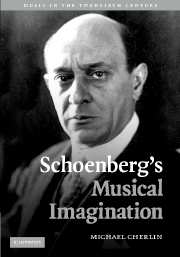Book contents
- Frontmatter
- Contents
- List of music examples and figures
- Acknowledgements
- Introduction
- 1 A passing of worlds: Gurrelieder as Schoenberg's reluctant farewell to the nineteenth century
- 2 Dialectical opposition in Schoenberg's music and thought
- 3 Dramatic conflict in Pelleas und Melisande
- 4 Motive and memory in Schoenberg's First String Quartet
- 5 Uncanny expressions of time in the music of Arnold Schoenberg
- 6 The tone row as the source of dramatic conflict in Moses und Aron
- 7 The String Trio: metaleptic Schoenberg
- Notes
- Bibliography
- General index – names and topics
- Index of Schoenberg's works and writings
1 - A passing of worlds: Gurrelieder as Schoenberg's reluctant farewell to the nineteenth century
Published online by Cambridge University Press: 22 September 2009
- Frontmatter
- Contents
- List of music examples and figures
- Acknowledgements
- Introduction
- 1 A passing of worlds: Gurrelieder as Schoenberg's reluctant farewell to the nineteenth century
- 2 Dialectical opposition in Schoenberg's music and thought
- 3 Dramatic conflict in Pelleas und Melisande
- 4 Motive and memory in Schoenberg's First String Quartet
- 5 Uncanny expressions of time in the music of Arnold Schoenberg
- 6 The tone row as the source of dramatic conflict in Moses und Aron
- 7 The String Trio: metaleptic Schoenberg
- Notes
- Bibliography
- General index – names and topics
- Index of Schoenberg's works and writings
Summary
Wir wurden aus dem Paradies vertrieben, aber zerstört wurde es nicht. Die Vertreibung aus dem Paradies war in einem Sinne ein Glück, denn wären wir nicht vertrieben worden, hätte das Paradies zerstört werden müssen.
[We were expelled from Paradise, but Paradise was not destroyed. In a sense our expulsion from Paradise was a stroke of luck, for had we not been expelled, Paradise would have had to be destroyed.]
Franz Kafka, “das Paradies” [translated by Willa and Edwin Muir]This chapter will function as an extension to the Introduction; rather than a study of Gurrelieder in its own right, the chapter functions as prelude to what follows. Schoenberg famously said that Gurrelieder was the key to his entire evolution. It is in that spirit that we approach the work.
Even a passing acquaintance will reveal that Schoenberg's Gurrelieder is a work of enormous energy and imagination, a composition of majestic power and scope. Its realization was an incredible act of will by a composer only twenty-six and twenty-seven years old during its original conception and composition, an accomplishment made even more extraordinary in that the work was laid aside for a decade, a time during which its composer had undergone perhaps the most radical sea change in the history of music. In the course of Schoenberg's life's work, there were other major compositions that were put aside in the hope of being completed later.
- Type
- Chapter
- Information
- Schoenberg's Musical Imagination , pp. 20 - 43Publisher: Cambridge University PressPrint publication year: 2007



